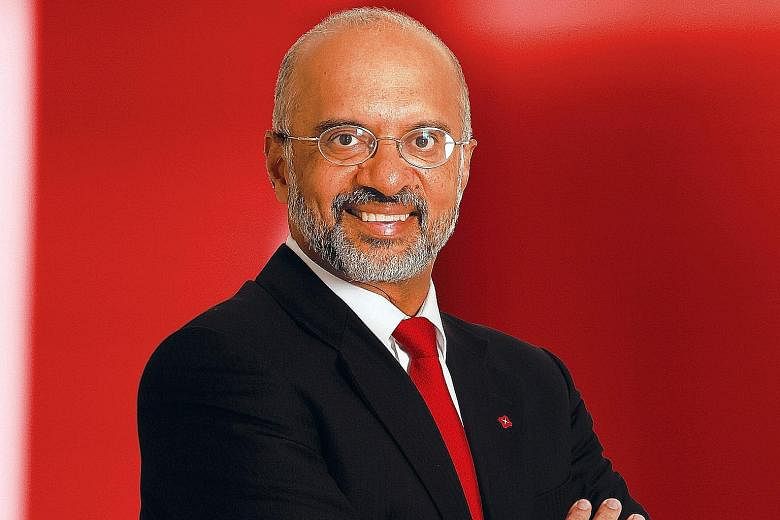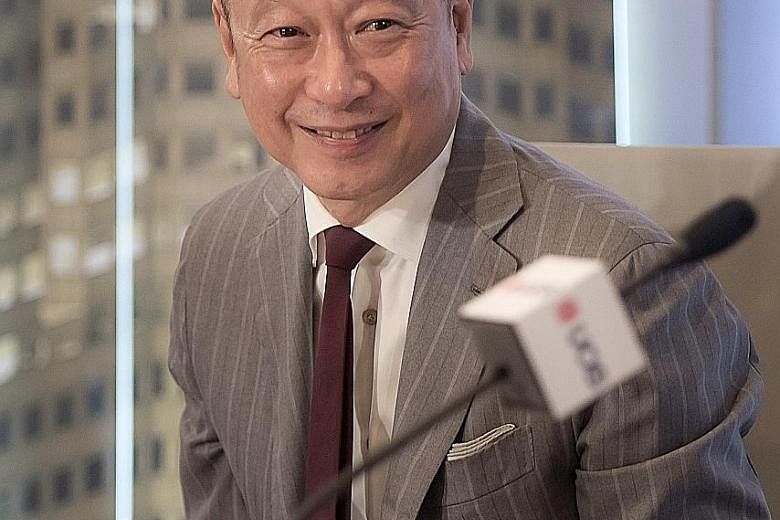DBS Group Holdings chief executive Piyush Gupta reaped a 23 per cent increase in pay to $10.3 million last year, according to the bank's annual report yesterday.
It marks quite a turnaround for him.
In 2016 he took home $8.4 million - down 23 per cent from 2015 after South-east Asia's biggest bank saw its profit slip because of higher charges for bad debts from its oil and gas loans.
Mr Gupta's best year was 2015, when he took home $10.9 million.
DBS posted a record $11.9 billion in income last year, while net profit increased 4 per cent to $4.39 billion, also a record.
Mr Gupta told shareholders in the report that a return on equity (ROE) of 13 per cent is a doable target after levels of 9.7 last year and 10.1 per cent in 2016.
DBS' ROE is typically lower than that of its smaller peers. OCBC Bank recorded 11.2 per cent last year, up from 10 per cent in 2016. United Overseas Bank (UOB) was 10.2 per cent, unchanged from 2016.
UOB's annual report, which was also out yesterday, noted that CEO Wee Ee Cheong reaped an 11 per cent pay rise to $9.4 million last year. Mr Wee and his family own about 18 per cent of UOB.
ROE numbers are a key focus of Mr Gupta, who said DBS has been around 11 per cent since 2010, similar to the preceding decade.
He sees improvement coming from three factors - higher interest rates, reduction in capital requirement and lower costs stemming from digitalisation.
"Normalising for allowances, our 2017 ROE would also have been at that level. However, the underlying returns of our business have been rising since 2010."
Wealth management income has quadrupled during that period and now accounts for 18 per cent of income, while cash management income crossed $1 billion last year from almost nothing, Mr Gupta said.
"Both are low-capital-usage and high-returns businesses. The proportion of capital-intensive trading income has halved to one-tenth of group income," he added.
"These improvements have been masked by the low interest rate environment and a build-up of our capital, both of which are now being reversed."
Interest rates have been low over the past decade, he said.
Three-month Singapore-dollar interbank rates, the benchmark for pricing domestic loans, have been hovering at around 1 per cent.
"With reflation in the global economy well under way, the general view is that interest rates around the world are on a cyclical upturn," Mr Gupta said.
"Given our balance sheet structure, a 1 percentage point increase in domestic interest rates roughly translates into a 1 percentage point improvement in ROE."
With the Basel rules released in December, DBS finally has clarity on capital requirements, he added. "The capital we have been building up because of the uncertainty can now be returned."
DBS announced a special dividend of 50 cents a share as the initial step to recalibrate its Common Equity Tier 1 (CET1) ratio closer to its long-term target of 13 per cent compared with the 14 per cent it has been operating on, he said.
It also raised the annual payout to $1.20 per share.
"The reduction in CET1 will be another driver for improving ROE," Mr Gupta noted, adding that the improvement to the cost-income ratio that digitalisation brings will be another.
Digitalisation lets DBS increase market share at lower marginal costs in developed markets and scale profitably into the granular SME and mass consumer segments in emerging markets.
A 5 percentage point improvement in the cost-income ratio translates into a 1 percentage point lift in ROE, he said.
"We believe an ROE of 13 per cent is readily achievable."
Mr Gupta also noted that the digital revolution is fundamentally redefining banking: "The explosion of big data means that... a huge part of the battle for the customer will be fought along data lines."


